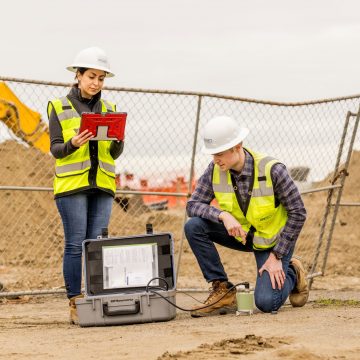Geotechnical Engineering What Is It and Why Is It Vital for Construction Jobs?
Geotechnical Engineering What Is It and Why Is It Vital for Construction Jobs?
Blog Article
A Thorough Review of the Key Solutions Provided by Consulting Civil Engineering Professionals in Modern Construction
Consulting civil design experts are essential to the success of contemporary building and construction jobs, supplying a complex collection of solutions that address various difficulties. From carrying out extensive site assessments and expediency research studies to guaranteeing compliance with stringent regulative structures, these specialists lay the foundation for risk-free and sustainable growth. Their knowledge reaches structural design and project administration, which are critical for attaining affordable and timely end results. As the intricacy of building and construction jobs continues to develop, comprehending the full range of solutions they supply comes to be progressively vital for stakeholders. What implications does this have for the future of construction methods?
Website Analysis and Usefulness Researches
When getting started on any type of building task, understanding the website's qualities is essential, as it straight impacts the expediency and layout of the growth. Website assessment and feasibility research studies are important parts of the pre-construction stage, making it possible for stakeholders to make informed choices. These studies involve a comprehensive evaluation of the physical, ecological, and regulative facets of the website.

Expediency research studies expand past the physical features, including social and economic factors to consider. This includes expense price quotes, possible roi, and community effect analyses. By integrating these aspects, civil design professionals can give an all natural sight of the site's feasibility for the intended growth. Ultimately, thorough website analyses and feasibility studies lay the foundation for effective task execution, optimizing and lessening dangers source allocation.
Structural Design and Evaluation
Adhering to a complete website evaluation and feasibility research study, the following important phase in the building and construction process is structural style and analysis. This crucial service entails the advancement of architectural systems that make certain the security, longevity, and economic viability of a task. Consulting civil engineers use sophisticated methods and software program to review lots, anxieties, and product properties, ensuring that layouts adhere to appropriate codes and standards.
Architectural design encompasses different elements, consisting of light beams, columns, foundations, and bearing walls. By applying concepts of mechanics and product scientific research, designers develop frameworks that can hold up against ecological forces such as wind, seismic task, and snow tons. The evaluation stage entails thorough calculations to anticipate the behavior of these frameworks under different problems, guaranteeing they can perform as planned throughout their life expectancy.
Moreover, getting in touch with engineers collaborate carefully with engineers and various other stakeholders to integrate architectural elements visually and functionally. The deliverables typically include in-depth drawings, specs, and thorough records that promote the building and construction procedure. Eventually, efficient structural design and evaluation are crucial in decreasing dangers, optimizing sources, and achieving successful project results in modern building.
Job Monitoring and Sychronisation
Effective project management and coordination are vital components of successful civil engineering solutions, guaranteeing that building and construction jobs are provided on schedule, within budget, and to the needed quality standards. Consulting civil engineers play a crucial role in managing various project aspects, from preliminary planning through to project completion. This includes not only the technical facets of style and building and construction but likewise the calculated monitoring of stakeholders, timelines, and sources.

Additionally, civil design specialists highlight the importance of documentation and reporting throughout the job lifecycle - geotechnical engineering in south africa. By preserving precise records, they make sure openness and accountability, which cultivates depend on among all celebrations included. Ultimately, skilled project monitoring and control result in improved project results, lining up with client expectations and adding to the general success of the construction undertaking
Regulatory Compliance and Permitting
Successful task monitoring prepares for dealing with regulatory compliance and permitting requirements in civil design tasks. Making certain adherence to local, state, and government policies is important for the successful execution and completion of any kind of building and construction venture. Consulting civil engineering specialists play an essential role in navigating the complex landscape of regulative frameworks and allowing processes.
These professionals are well-versed in zoning regulations, constructing codes, ecological laws, and safety and security requirements that control building and construction practices. They carry out extensive assessments to determine all appropriate laws, guaranteeing that projects abide by needed lawful needs. By working together with governmental firms and stakeholders, getting in touch with designers facilitate the allowing process, simplifying approvals read the article and decreasing delays.
In addition, they prepare and submit the requisite documents, such as site strategies, environmental effect assessments, and design reports. This positive approach not only cultivates compliance however also improves task feasibility and sustainability. Inevitably, effective regulative compliance and permitting are important elements of a successful civil design project, guarding both the environment and public well-being while adding to the total integrity and success of construction initiatives.
Sustainable Layout Practices
Lasting design methods are significantly acknowledged as essential elements in civil engineering, with a concentrate on decreasing environmental impact while making the most of resource effectiveness. These techniques incorporate a variety of techniques aimed at advertising eco-friendly equilibrium and reducing the carbon footprint of construction jobs.
One secret element of lasting layout is the integration of renewable energy sources, such as solar and wind, into structure layouts. This not only decreases dependence on fossil gas yet also enhances lasting cost savings. Additionally, the use of lasting products, consisting of rapidly renewable find out or recycled resources, plays a considerable function in lessening waste and preserving all-natural resources.
Water management techniques, such as rainwater harvesting and efficient irrigation systems, are additionally crucial in lasting layout. These practices assist in lowering water intake and shielding local water environments. Furthermore, eco delicate site planning makes certain minimal disruption to the natural landscape and promotes biodiversity.
Consulting civil engineering professionals contribute in implementing these lasting style practices. Their know-how permits the implementation of ingenious services that straighten with both regulative requirements and customer objectives, inevitably contributing to an extra sustainable constructed atmosphere.
Conclusion
In summary, speaking with civil design professionals give necessary services that underpin the success of modern-day building tasks. Through thorough site evaluations, innovative architectural design, reliable project administration, adherence to regulatory criteria, and the application of lasting practices, these professionals add to the creation of risk-free, reliable, and ecologically responsible growths. The integration of these crucial services not just enhances task end results but additionally advertises a sustainable future in the construction industry.
Effective project administration review and control are vital elements of effective civil design solutions, ensuring that construction projects are provided on time, within budget plan, and to the called for quality standards. Consulting civil engineers play a critical role in orchestrating various job aspects, from preliminary preparation via to predict conclusion. Ultimately, skilled task management and sychronisation lead to boosted project results, straightening with client expectations and adding to the total success of the construction venture.

Report this page